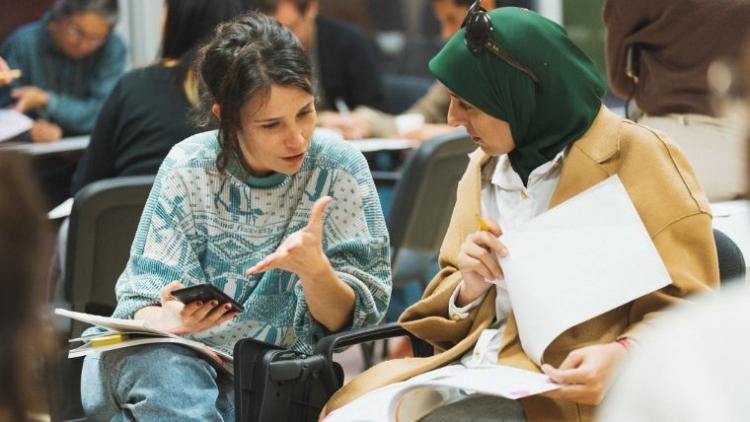The importance of interreligious dialogue for community building
We could begin by talking about today’s plural, complex societies, but as sociologist Joan Estruch [1] warns, ‘the phenomenon of pluralism is not exclusive to modernity’. Guided by theologian and philosopher Raimon Panikkar, [2] we can instead look at the individualism endemic to our times and say that this is where the urgency of dialogue is revealed.
Following the original direction of this reflection, let us add a reference to the philosopher Josep M. Esquirol, [3] who speaks of the ‘need to examine the meaning of things up close’, which means not only taking the ‘broad view’. If we wish to explore the need for dialogue in community building, we can draw on the relationship between attention and dialogue posited by Esquirol. [4] The philosopher says that dialogue must be preceded by an attentive gaze if it is to be worthwhile.
But our focus is not on dialogue about everyday, superficial issues. We want to discuss dialogue that explores values, practices and the meaning of life through the lens of different religions and faiths. It’s about creating spaces for listening and observing, where respect and carefully chosen words are essential. Within this setting, it is important to revisit a reflection by Esquirol and remember that ‘the word protects, cocoons and comforts’ [5].
Interreligious and interfaith dialogue groups are meeting places where we can recognise the principles and roles of people from different religions and faiths (including agnostics and atheists) and create collaborations and joint projects.
Group meetings can be an enriching opportunity for all forms of expression, because learning about others allows us to analyse together not only what we have in common, but also to understand the reasoning that leads to new ways, be they convergent or divergent. Although they may seem like a challenge at first, these groups can become an experience of recognising others in all their diversity. In a sense, this respectful form of dialogic dialogue allows us to understand other perspectives, other ways of feeling and doing things, with which we can share and grow.
We must also engage in the inner reflection and education that makes understanding possible. In other words, we need to be careful about how we communicate and willing to consider ideas that differ from our own. Of course, the aim is not to convert others, but to deal ethically with complexity in order to avoid misunderstandings and prejudices, so that we can join together in a shared quest for meaning. And it is precisely this that can facilitate social cohesion, leading to the creation of new collaborative networks of well-being. The aim is to share actions, needs and concerns, and to find tools and mechanisms to support each other as good neighbours should.
Interreligious and interfaith dialogue opens up the possibility of questioning the meaning of life from different perspectives or worldviews. In the words of the philosopher and theologian Francesc Torralba, ‘human beings, by virtue of their spiritual intelligence, are capable of questioning the meaning of our existence and have the power to ask what really makes our time on earth valuable and meaningful’ [6].
Through Torralba’s perspective, we can see that one can be spiritual without being religious, and one can be religious without belonging to a particular religion. This line of analysis can help us to bring flexibility to an array of situations that may arise at the meetings.
The spiritual intelligence that underpins dialogue enables us to grow stronger after challenging each other, because the framework of respect we offer is not exclusive but reflective. Interreligious and interfaith dialogue gives us the opportunity to transform reality, because it allows us to take a difference that could be a source of conflict and turn it into a situation of understanding or disagreement, but without violence.
Finally, as a form of dialogic dialogue that seeks mutual understanding, interreligious and interfaith dialogue equips us with tools to build community, break down prejudices and foster intercultural and interreligious tolerance. In other words, participation in interreligious and interfaith dialogue groups is a way of working towards peace and unity.
Margarita Díaz
Technique of the Barcelona Inter-religious and Inter-convictional Dialogue Groups
[1]Estruch, Joan (2015) Entendre les religions, p. 173
[2]Panikkar, Raimon (2008) A https://www.nodualidad.info/recursos/pdf-articulos/El-dialogo-intrareligioso.pdf
[3]Esquirol, Josep M. (2021) Humà, més humà, p. 14
[4]Esquirol, Josep M. (2006) El respeto o la mirada atenta. Una ética para la era de la ciencia y la tecnología, pp. 94-95
[5]Esquirol, Josep M. (2015) La resistència íntima. Assaig d’una filosofia de la proximitat, p. 158
[6]Torralba, Francesc (2011) Inteligencia espiritual, p. 79

